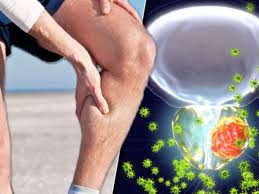Prostate cancer is the second most common cancer in men, with over 190,000 new cases diagnosed in the United States each year. While most men are familiar with common symptoms such as frequent urination, blood in the urine, and erectile dysfunction, there are some unusual symptoms that can manifest in the legs and feet. Being aware of these lesser-known symptoms can help in early detection and timely treatment of prostate cancer.
Here are the top 7 unusual prostate cancer symptoms in legs and feet that every man should know:
1. Swelling in the Legs:
Swelling in the legs, ankles, or feet can be a sign of advanced prostate cancer that has spread to the lymph nodes or other areas of the body. This swelling, known as edema, occurs due to the blockage of lymphatic vessels by cancer cells. If you notice unexplained swelling in your legs or feet, make sure to consult a healthcare provider for further evaluation.
2. Numbness or Weakness:
Prostate cancer that has metastasized to the spine can compress the spinal cord, leading to symptoms such as numbness, tingling, or weakness in the legs and feet. This condition, known as spinal cord compression, requires immediate medical attention to prevent permanent damage. If you experience any changes in sensation or strength in your lower extremities, seek medical help promptly.
3. Bone Pain:
Prostate cancer commonly metastasizes to the bones, especially the spine, pelvis, and legs. Bone metastases can cause persistent pain, tenderness, or fractures in the affected areas. If you have unexplained bone pain in your legs or feet, it’s essential to undergo a thorough evaluation to rule out the possibility of prostate cancer spread.
4. Difficulty Walking:
As prostate cancer progresses and spreads to the nerves or bones in the legs, it can interfere with mobility and coordination, leading to difficulty in walking or maintaining balance. If you notice changes in your gait or experience unexplained difficulties in walking, discuss these symptoms with your healthcare provider to determine the underlying cause.
5. Swollen or Painful Joints:
In some cases, prostate cancer can cause inflammation in the joints of the legs and feet, resulting in swelling, stiffness, or pain. These symptoms may mimic arthritis but do not respond to conventional arthritis treatments. If you have persistent joint pain or swelling in your lower extremities, consider getting screened for prostate cancer as a preventive measure.
6. Muscle Weakness:
Prostate cancer that spreads to the nerves or muscles in the legs can lead to muscle weakness, cramps, or spasms. You may find it challenging to perform daily activities that require strength and coordination. If you experience unexplained muscle weakness in your legs or feet, seek medical advice for proper diagnosis and management.
7. Lymphedema:
Lymphedema is a condition characterized by the accumulation of lymph fluid in the tissues, leading to swelling and discomfort in the affected body part. Prostate cancer treatment, such as surgery or radiation therapy, can disrupt the normal flow of lymphatic fluid and result in lymphedema in the legs or feet. If you develop persistent swelling or heaviness in your lower limbs after prostate cancer treatment, consult a lymphedema specialist for appropriate care.
In conclusion, being aware of these unusual prostate cancer symptoms in legs and feet is crucial for early detection and intervention. If you experience any of these symptoms, do not ignore them or attribute them to aging or other benign causes. Timely medical evaluation and appropriate treatment can make a significant difference in managing prostate cancer effectively. Remember, early detection saves lives, so prioritize your health and well-being by staying informed and proactive about your prostate health.

